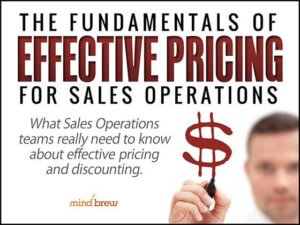How many things are on your to-do list right now?
If you’re like most sales ops folks, that list is fairly long, and it’s jam-packed with important tactical and administrative matters that need to get done. You have reports and forecasts to prepare, a few tweaks to make to the CRM system, a new training program to plan, a new piece of sales collateral to proofread and somehow you’ve also gotten stuck organizing the upcoming sales team meeting.
When we talk with sales operations people about becoming more strategic, their first reaction is often: “I’m already too busy as it is. I can’t add anything else to my plate right now!”
And the truth is, they—and you—are not wrong. You do already have too many things to do. The question is, are the things currently on your to-do list the best use of your time?
Warren Buffett has been quoted as telling business school students, “I could improve your ultimate financial welfare by giving you a ticket with only 20 slots in it so that you had 20 punches—representing all the investments that you got to make in a lifetime. And once you’d punched through the card, you couldn’t make any more investments at all.” He adds, “Under those rules, you’d really think carefully about what you did and you’d be forced to load up on what you’d really thought about. So you’d do so much better.”
The idea of this “20-slot rule” is that if you focus on making a few good decisions, you’ll be much more successful than if you make a whole bunch of decisions haphazardly.
In most B2B companies, people in every department tend to focus so much on their small sphere of influence that the big picture is sometimes neglected. No one is asking strategic questions like
- What types of prospects are the most likely to buy from us?
- Which types of deals perform the best for our company?
- Which of our customers could be buying more products or additional products from us?
- Which customers are starting to show signs of defection?
- Which of our sales reps are best as closing which types of deals?
Most sales ops teams have analytics technology at their disposal that could answer these types of questions. What they don’t have—or what they thing they don’t have—is time.
If you want to take your sales operation to the next level, you’re going to have to “scrape the plate” and get rid of some of the less important things you do so that you can focus on things that are more important.
How do you decide which things should go?
You can start by applying Buffett’s 20-slot rule to your time. Ask yourself, “If I could only do twenty things this month or this quarter, what would I want them to be?” Talk with your boss and your team about which things on your to-do list are really essential and which are just nice-to-haves. When one sales ops manager went through this process with her team, she found that they were able to free up 30 percent of their time to focus on strategic initiatives.
There’s a whole minimalism movement that is becoming increasingly popular. Some people have even decided to wear the same clothes every day or eat the same foods every day so that they can spend less time thinking about little things and free up more time for more important stuff. We’re not saying that you have to go that far, but you could probably eliminate a report or two or hand off some meeting planning or CRM admin tasks to someone else in order to make some time for more strategic projects. Ultimately, not doing some of the work you’re doing now could make you much more valuable to your company in the long run.











